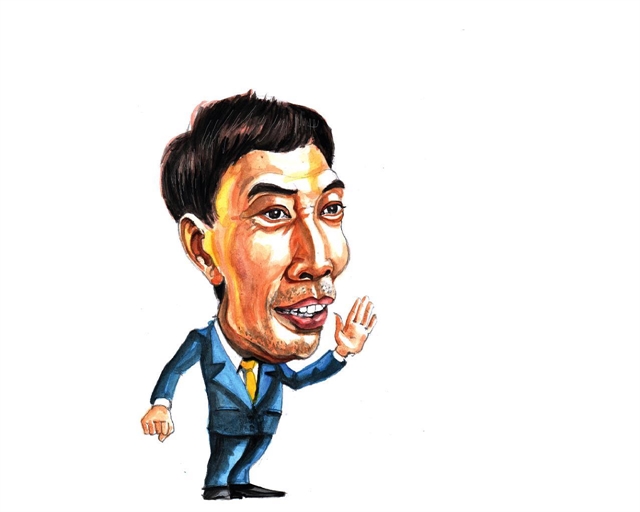 Economy
Economy

To achieve the UN Sustainable Development Goals (SDGs), the private sector is vital for Việt Nam.

|
| Võ Trí Thành |
* Võ Trí Thành
The world is facing many sustainability challenges that need concerted efforts from different stakeholders to address to fulfil the UN's 2030 Agenda. Sustainable development will continue receiving great attention around the world and in Việt Nam in the next decade.
To achieve the UN Sustainable Development Goals (SDGs), the private sector is vital for Việt Nam.
Vietnamese businesses face both challenges and opportunities in the process of economic transition and deeper international integration. Social enterprises may find fertile ground to grow and contribute more significantly to the economy and society.
Social business is widely understood as a business which is aimed at addressing a social cause. On the other hand, a traditional enterprise is often driven by economic responsibility. Traditional entrepreneurs must find ways to optimise all resources to maximise profit for shareholders.
Without a doubt, the traditional business concept cannot solve many social and environmental problems such as inequality, pollution, climate change and poverty that endanger civil society and sustainable development.
In Việt Nam, the idea of corporate social responsibility is getting more and more attention. The sustainable business model tries to catalyse the development of business activities towards addressing pressing social and environmental challenges.
In a market where competition becomes more and more fierce, the rising demand from customers and requirements from overseas markets are putting higher pressure on businesses and how they give back to society.
Corporate social responsibility (CSR) has been introduced to Việt Nam in the past 10 years. Though it is still fresh, more and more companies are adopting CSR practices for both economic and social responsibilities.
Increasingly, businesses are realising the benefits of investing to protect the environment and advance social outcomes. These acts are not just philanthropy or charity but also makes good business sense.
The results of many studies have demonstrated businesses that performing well in CSR activities often brings significant benefits, including support and recognition of the community which can lead to growth in customers, increasing brand value, lower layoff rates, higher productivity and wider opportunities to access new markets.
A 2019 Nielsen survey result showed clean brands and brands committed to green and clean products enjoyed profits four times higher than average by 2.5-11.4 per cent.
New business concepts and models such as green economy, circular economy, the creative economy and smart cities, as well as new development ideas and pressure from global commitments (SDGs, the Paris climate agreement) and obligations for international trade agreements (CPTPP, EVFTA) are accelerating the requirement for sustainable business models.
Enterprises that want to develop sustainably must comply with standards on environmental protection, working environment, gender equality and labour rights. Businesses can pursue their social responsibility by obtaining an international certification or adopting a code of conduct.
A number of Vietnamese enterprises have done so but most of them are big companies. Giants such as Unilever, Coca Cola, Vingroup and Hòa Phát Group have built their social responsible brands on strong CSR strategies.
However, most small and medium enterprises (SMEs), which currently cannot afford such efforts, are also encouraged to voluntarily apply CSR standards.
Việt Nam is one of the few countries that recognise the legal status of the social enterprise (SE) in the Enterprise Law 2015. Article 10 provides a legal definition of a social enterprise, specifying an SE must register as an enterprise under Vietnam Enterprise Law 2015, have clear social and environmental objectives and be committing to reinvesting at least 51 per cent of its profits for registered social and environmental objectives.
Though it has few, Việt Nam has also adopted several policies supporting such businesses including tax incentives, infrastructure and facility preferences.
However, a 2018 study on social impact businesses (SIBs) conducted by the National Economics University and UNDP introduced a wider concept than SEs. SIBs are understood to include organisations that have both trading activities and a commitment to positively impacting society/the environment in their operations.
The study showed the number of SIBs was about 22,000, or 4 per cent of all active enterprises in Việt Nam in 2018.
The SIB community has grown rapidly with 40 per cent of SIBs being established since 2015. According to the study, the development of such businesses has brought many positive impacts.
More than 99 per cent of SIBs employ women. These businesses target three sectors including health and wellbeing, job creation and environmental protection. They operate in two major industries such as agriculture, fisheries and dairy and education and training.
Việt Nam has a vibrant and rapidly growing ecosystem for SIBs. There is huge potential to grow this business model in Việt Nam. However, it needs the efforts of different stakeholders.
A media campaign about the nature and benefits of CSR and SIB, especially in enterprises and among entrepreneurs and policymakers, is essential. Firms also need to enhance their management capacity, productivity to keep up new business models and promote wise consumption.
Meanwhile, the Government needs to introduce more supporting mechanisms and policies beyond existing law so that businesses can fulfil their social responsibilities. Their efforts may need significant investment cost the companies themselves cannot afford. They need preferential policies to access capital and other financial resources.
On top of that, the Government can provide support and use the results of social responsibility to offer them bigger backing, thereby supporting the winner. This mechanism could apply for SIBs and start-ups.
*Võ Trí Thành is a senior economist at the Central Institute for Economic Management (CIEM) and a member of the National Financial and Monetary Policy Advisory Council. The holder of a doctorate in economics from the Australian National University, Thành mainly undertakes research and provides consultation on issues related to macroeconomic policies, trade liberalisation and international economic integration. Other areas of interest include institutional reforms and financial systems.









